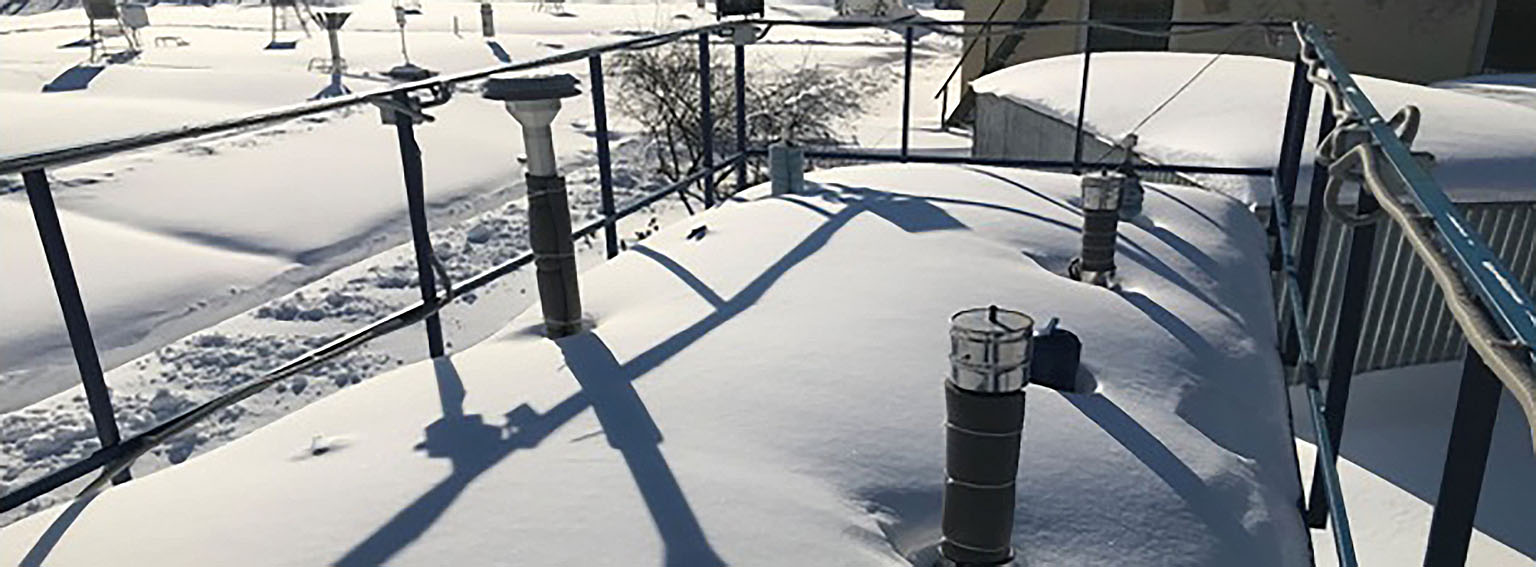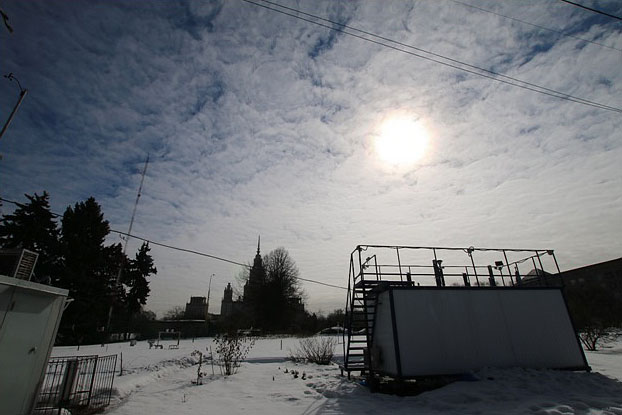Instrumental Aerosol Complex Facility

High rates of pollutant emissions in cities have led to the accumulation of a huge amount of tiny suspended particles in the atmosphere – aerosols. Anthropogenic aerosols have a complex chemical composition, including environmentally hazardous components from man-made emissions. Modern techniques for analyzing air quality allow scientists to conduct scientifically sound assessments of the ecological state of the megalopolis environment. The instrumental aerosol complex facility is part of an innovative system for continuous analysis of aerosol pollution of the capital's atmosphere. The project holds special social significance in improving the quality of life for urban residents, opening up prospects for implementing effective environmental strategies and developing measures to reduce the harmful effects of air pollution in the Moscow metropolitan area as a whole.
In 2020, a new aerosol complex was opened on the grounds of The Meteorological Observatory at Moscow State University (MSU). The joint project between the Geography Department of MSU and the Research Institute for Nuclear Physics at MSU, with the support of the MSU Development Program, made this possible.
The MSU Aerosol Complex's instrumental equipment was installed with the help of a grant to renew equipment for scientific research as part of the federal project "Development of Advanced Infrastructure for Research and Development in the Russian Federation", which is part of the national project "Science and Universities".
Technologies and Tools
The aerosol complex of Moscow State University is developing technologies for the comprehensive analysis of environmentally hazardous aerosol pollutants and their impact on human health. The ongoing research is a new step towards improving Moscow's air quality.
-
The simultaneous analysis of the mass concentration of particles smaller than 10 microns (PM10) in air quality standards and smaller than 2.5 microns (PM2.5) is carried out in order to assess the impact of microparticles on human health. In addition, the microphysical properties and chemical composition of airborne aerosols are also analyzed.
-
A scientifically-based methodology for continuous and seasonal data collection, as well as simultaneous air sampling, is used. The physicochemical analysis of the aerosol components allows us to determine the composition of climatically-active and environmentally-hazardous pollutants in the Moscow atmosphere. These results are processed by modern means of Global Atmospheric Watch (GAW) global environmental monitoring networks.
-
The latest methodology for sampling polluted air using automated collectors and impactors, with a particle size range from nanometers to tens of microns, has been introduced.
-
This complex is equipped with automated counters that continuously measure the microphysical properties of aerosols, including the number and size distribution of particles, as well as the mass concentration of particles in a size range less than 10 micrometers.
-
A unique aetalometric technique is used to measure a climatic tracer known as black carbon, which is found in the exhaust products of natural fuel sources such as gas, gasoline, and diesel.
- Analytical chemistry methods, such as gas and ion chromatography and ion-induced plasma mass spectrometry, have been developed to provide a high-quality chemical analysis of organic and ionic compounds, including heavy metals, in aerosol samples. Nanometer-resolution electron microscopy techniques are used to analyze the composition of nanoparticles. Multivariate statistical analysis methods are being developed to quantify the contributions of various sources of urban air pollution, such as transport, industry, road dust, and thermal power systems, to the emissions of hazardous and toxic compounds.
Projects based on the aerosol complex facility
Based on the Aerosol Complex at Moscow State University, various projects are currently underway:
-
RSF Project No. 19-77-30004 "Technology for assessing the ecological state of the Moscow megapolis based on the analysis of the chemical composition of microparticles in the atmosphere–snow–road dust–soil–surface water system (Megapolis)"
-
Project of the Ministry of Science and Education of the Russian Federation No. 075-15-2021-574 "Megapolis as an island of pollution and heat: interdisciplinary hydroclimatic, geochemical and environmental analysis"
- Agreement on the provision of grants from the federal budget in the form of subsidies in accordance with paragraph 4 of Article 78.1 of the Budget Code of the Russian Federation to ensure the conduct of scientific research by Russian scientific organizations and (or) educational organizations of higher education together with organizations from EU member states within the framework of multilateral cooperation in the Horizon 2020 program, including ERA initiatives within the framework of ensuring the implementation of the program of bilateral and multilateral scientific and technological cooperation No. 075-15-2021-938 dated September 30, 2021. "Development of infrastructure for air quality assessment in the Moscow megalopolis".

Publications
Popovicheva O., Diapouli E., Chichaeva M.. Kosheleva N., Kovach R., Bitukova V., Eleftheriadis Konstantinos, Kasimov N. Aerosol characterization and peculiarities of source apportionment in Moscow, the largest and northernmost European megacity //Science of The Total Environment. – 2024. – С. 170315.
Serdyukova A., Vlasov D., Popovicheva O., Kosheleva N., Chichaeva M., Kasimov N. Elemental composition of atmospheric PM10 during COVID-19 lockdown and recovery periods in Moscow (April–July 2020) //Environmental Geochemistry and Health. – 2023. – Т. 45. – №. 11. – С. 7909-7931.
Zappi A., Popovicheva O., Tositti L., Chichaeva M., Eremina I., Kasper-Giebl A., Tsai Y., Vlasov D., Kasimov N. Zappi A. et al. Factors influencing aerosol and precipitation ion chemistry in urban background of Moscow megacity //Atmospheric Environment. – 2023. – Т. 294. – С. 119458.
Popovicheva O., Chichaeva M., Kovach R., Zhdanova E., Kasimov N. Seasonal, Weekly, and Diurnal Black Carbon in Moscow Megacity Background under Impact of Urban and Regional Sources //Atmosphere. – 2022. – Т. 13. – №. 4. – С. 563.
Aerosol Complex of Moscow State University for developing air quality infrastructure in Moscow megacity
PEEX Arctic-Boreal Hub Newsletter Issue #18 - September 2021
View newsletter online
Aerosol Complex of Moscow State University for developing air quality infrastructure in Moscow megacity.
Popovicheva O., Volpert E., Sitnikov N., Chichaeva M., Padoan S. Black carbon in spring aerosols of Moscow urban background. Geography, Environment, Sustainability, Vol. 13, No 1, p. 233-243, 2020
Popovicheva O., Padoan S., Schnelle- Kreis J., Nguyen D. L., Adam T.W. et al.. Spring aerosol in urban atmosphere of megacity: analytical and statistical assessment for source impacts. Aerosol and Air Quality Research. 20: 702–719, 2020
Vlasov D., Kosheleva N., Kasimov N. Spatial distribution and sources of potentially toxic elements in road dust and its PM10 fraction of Moscow megacity. Science of the Total Environment, 143267, 2020
Kasimov N.S., Vlasov D.V., Kosheleva N.E. Enrichment of road dust particles and adjacent environments with metals and metalloids in eastern Moscow. Urban Climate. Vol. 32, 2020
Vlasov D., Vasil’chuk J., Kosheleva N., Kasimov N. Dissolved and suspended forms of metals and metalloids in snow cover of megacity: Partitioning and deposition rates in Western Moscow. Atmosphere. Vol. 11, 9, 2020
Popovicheva O., Ivanov A., Vojtisek M. Functional Factors of Biomass Burning Contribution to Spring Aerosol Composition in a Megacity: Combined FTIR-PCA Analyses, Atmosphere,11, с. 319-339, 2019


